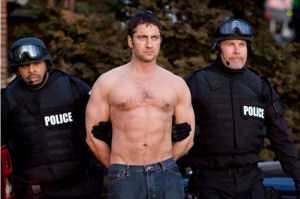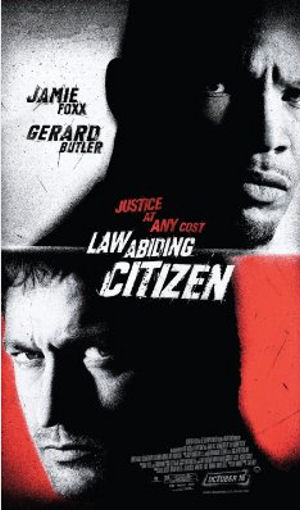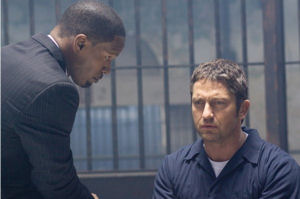|
Law
Abiding Citizen Movies
that feature the killer-as-teacher trope walk a fine line.
On one hand the killer has a possibly valid point; on the
other hand he's torturing and/or killing people. There are
some basic requirements in that the killer has to be ruthless,
smart, and charismatic and the lesson they're teaching has
to have a kernel of truth in it. However, their methods
are so extreme that it's impossible to accept the lesson
as a whole.
This
has been done in recent years with the Joker in The
Dark Knight, John Doe in Seven, Jigsaw in
the Saw movies, and even Hannibal Lecter. All of
these killers are committing their crimes with little thought
of "getting away with it," but instead the primary
goal of their reign of destruction is to teach the protagonist
a lesson. The lesson usually applies a clear and even logic
but twists it to such a hyperbolic extent that anything
learned would be Pyrrhic for the learner.
Finally,
in order for the movie to hit home, the moral to learn must
so be terrifying or difficult for the protagonist to accept
or the methods must so be extreme that the audience comes
down on the protagonist's side, if only slightly.
Law
Abiding Citizen interestingly attempts to apply this
frame to an extremely sympathetic character, but one of
the many flaws of the film is that the killer's lesson and
motivation is so scatter-shot or contradictory that it loses
almost all it's power as the engine of the story and cannot
overcome the repugnance of his actions or massive stacks
of implausibility that mount near the end of the movie.
Law
Abiding Citizen finds Gerard Butler starting the movie
in his best "normal guy" wig to play Clyde Shelton,
a killer-to-be whose family is murdered by a psychopath
and his "I'm just here to burgle" accomplice during
a random home invasion. Clyde is denied complete justice
when Nick Rice, an assistant DA played by Jamie Foxx, decides
to strike a deal with the more loathsome and guilty of the
two thugs in order to get two guaranteed convictions instead
of risking a loss at trial. The abortion of justice is a
bitter pill for Clyde and ten years later he gets a haircut
and launches a campaign of righteous "punishment"
aimed at those he feels are responsible, from the criminals
who murdered his family all the way up to the mayor of Philadelphia.
 |
While
it is fun to watch Butler play Clyde, who is a twisted mix
of Jigsaw, MacGyver, and the Punisher, the murkiness of
his motivations and philosophy make him a frustrating character
to nail down. He starts by punishing the criminals he knows
are responsible for the murder of his family and branches
out to other he feels are responsible, but quickly starts
targeting people whose only sin would be compliance in the
face of an abused system.
By that
logic, I should be checking my laptop for bombs right now,
as I personally haven't done anything to try to fix the
modern legal system.
Clyde
also seems to contradict himself. After his initial arrest,
when the DA has nothing creating a concrete link between
him and his first two murders, he makes a compelling legal
argument for being granted bail, but when the judge moves
to grant him his rights he rails against her for not keeping
him in custody when he's talking about confessing to murder.
He finally makes her a target not only because she presided
over his initial case, but also seemingly in part because
she's willing to compromise someone's civil rights.
Indeed,
the line, "You want me to deny him his civil rights?"
seems to be a death-song in this movie. Ironically, it would
seem that if Clyde had his way, suspicion of murder would
be enough to deny someone their rights. When it comes to
the question of whether Clyde is out for petty revenge or
wants to actually enact some change, the movie doesn't seem
to know which side it wants to come down on, and that ends
up distancing the viewer from the story.
The plot itself is an increasingly difficult exercise in
suspending disbelief, and while it's unrealistic and far-flung,
much of the movie effectively works to keep you guessing
as to how Clyde's plan will play out. When a big reveal
shows up near the end of the film, however, it essentially
takes all the wind out of the story. When the movie takes
away the tension of wondering when the next attack is going
to come and lays all it's cards on the table, it turns out
it's a very boring and lazy hand.
If nothing else, the majority of the movie is exciting and
has engaging, if not borderline hammy, performances from
it's two lead actors. There are definitely a few good visceral
shocks, squirms, and explosions packed into an increasingly
ridiculous story. In the end, the movie's undoing lies in
the erratic behavior and motivations of it's killer-teacher,
which must be applied uniformly in order to work well.
It's muddled enough that I can't whole-heartedly recommend
it, but at the same time it's entertaining enough that it
wouldn't be a complete waste of your time. That is, if you
don't mind late-90s-crime-movie level implausibility and
not knowing, exactly, who you should be rooting for.

|
|








